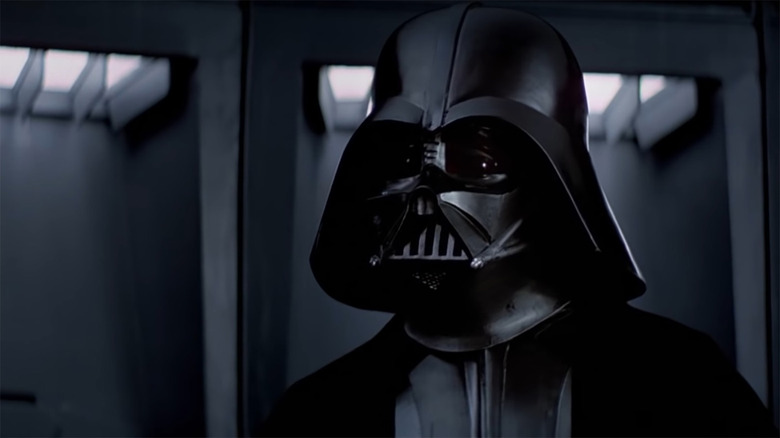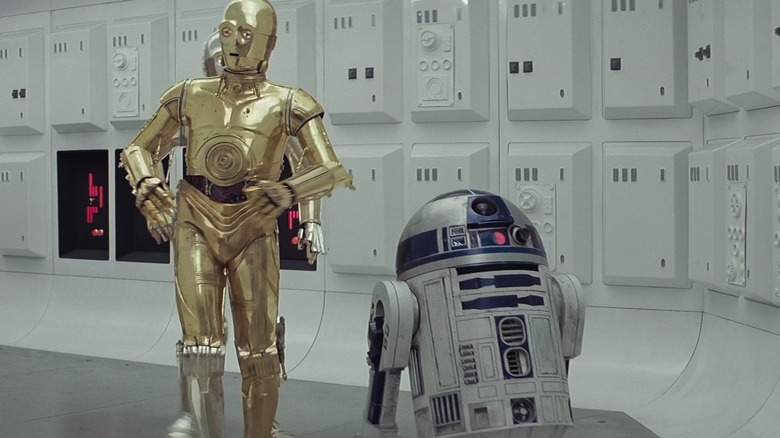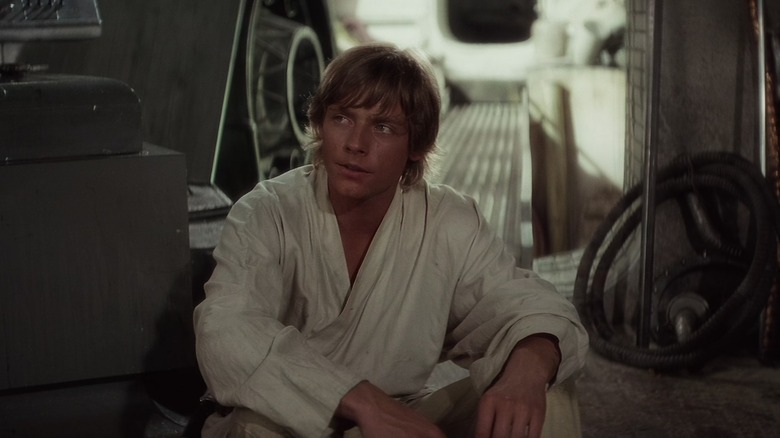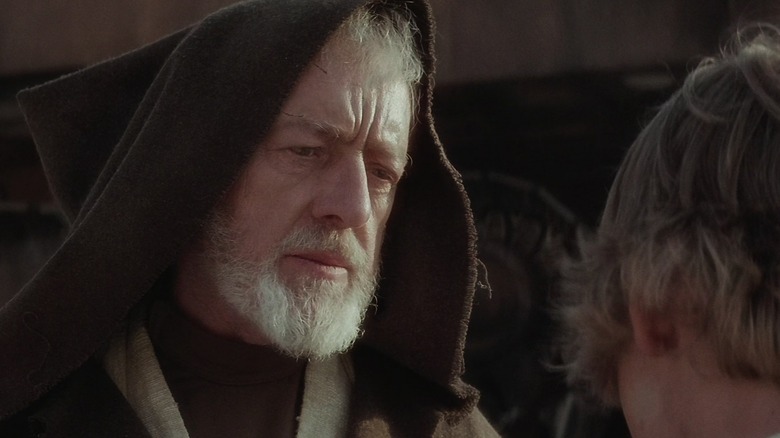George Lucas Initially Dismissed Star Wars' Success After Its Opening
It's not unusual for artists to have a complicated relationship with their work. Whether it's a piece that fails to land with viewers or a successful passion project that ultimately gets sucked into the commercial machine, it's an especially tight line for filmmakers to walk. For George Lucas, 1977's "Star Wars" (by 1981 it would be retitled "Star Wars: Episode IV – A New Hope") was the latter: an offbeat, mystical science fiction film that he had spent years developing and for which he had the lowest expectations. After all, the story of Luke Skywalker (Mark Hammill) leaving the comfort of his home planet to learn the ways of the mystical Force and befriend a ragtag rebel group facing off against an evil Empire was no sure thing.
"Star Wars" would go on to cast an awfully long shadow, creating a massive franchise and media phenomenon that would tie Lucas up for a total of two decades. But in the early going, Lucas was convinced his years of work would be for nothing and though his tribute to the Westerns, sci-fi serials, and Akira Kurosawa movies (such as the foundational "The Hidden Fortress") of his youth would end up being quirky flop. While that certainly wasn't the case, his assumption that it would fail was the more practical one. In fact, he chose to ignore the news of its early success.
Lucas had gone on vacation in Hawaii just before the movie's premiere, all in service of not having to bear what he was sure would be bad news. He dismissed the positivity he did hear, until it became impossible to ignore the truth: his personal space opera was a huge hit, soon to be one of the biggest movies ever.
Nobody saw it coming
George Lucas wasn't alone in thinking the movie would fail either. Everybody was a little bit skeptical of what he had concocted with "Star Wars," and they let him know.
When several of his fellow filmmakers, such as John Milius, Brian De Palma, and Steven Spielberg, watched an assembly cut of the movie, only Spielberg saw the makings of a hit movie, according to Peter Biskind's "Easy Riders, Raging Bulls." According to that same book, Lucas' film editor wife Marcia Lucas burst into tears at the sight of the movie, believing it would pale in comparison to the other film she was working on: Martin Scorsese's notorious, and brilliantly abrasive, musical flop "New York, New York."
Despite the self-evident cracks in "Star Wars," from the unfinished effects to the sloppy editing to the World War II stock footage Lucas had used to convey the space battles, there was something special there. Even if Lucas's filmmaker friends largely couldn't see it, certain 20th Century Fox executives, like Alan Ladd, Jr. felt like it was bound to be a hit. According to "Empire of Dreams: The Story of the Star Wars Trilogy," they let Lucas go over-budget as the movie continued its descent into post-production hell.
Maybe what Spielberg and Ladd sensed was the modern-day fairy tale vibe Lucas had in mind while developing the film. Per TIME, Lucas had described the film on its release as a hodgepodge of "all the fun things and fantasy things" he remembered from childhood. Even now "Star Wars" feels remarkably light on its feet and optimistic, totally removed from the self-important, inflexible mythology that has weighed down the series for the last decade as it plots continual expansion.
A painful process
TIME quoted George Lucas as asking, "Where are the romance, the adventure, and the fun that used to be in practically every movie made?" His movie was the answer, and viewers felt the same way. The '70s was a decade that took mainstream American cinema further than it had ever gone before, into the darker corners of human nature even in some of its most underrated, underseen films. "Star Wars," meanwhile, could have come out of the most innocent serials of the '30s and '40s.
Still though, Lucas found the experience of directing the film to be "extraordinarily painful" as he told TIME, definitely in opposition to the relative ease he had found on his first two lower-budget feature films, the grim sci-fi of "THX-1138" and the loving coming-of-age of "American Graffiti." Working with a massive team of nearly 1,000 people, he became a film director barking orders rather than the crafter of images he'd dreamt of being. Maybe that misery and pain is what led to his doubts about the project.
According to "Empire of Dreams," 20th Century Fox had felt the need to boost the movie's bookings with a carrot for exhibitors: they would need to screen "Star Wars" if they had any interest in screening what they felt would be the big hit of the summer, an adult drama called "The Other Side of Midnight." Nobody could have seen the phenomenon of "Star Wars" coming, and on the movie's release, the Lucas family took a vacation in Hawaii. If you have to hear about how badly the movie you made is doing, you may as well be on the beach.
More than just science fiction fans
In 2015, George Lucas would tell Stephen Colbert about that Hawaiian vacation, according to Insider, recalling specifically how he rejected studio head Alan Ladd, Jr.'s continual suggestions that the movie was vastly outperforming expectations. Whatever excitement Ladd might have had about the movie drawing crowds around the block, Lucas had the more cynical viewpoint. "Laddie, calm down," he told him.
The big crowds were just the usual science fiction lovers, going out to see the big new science fiction movie. Having a big opening week was practically a fluke, according to Lucas' pessimistic view. The filmmaker found the whole process of getting congratulated on the movie's success frustrating, especially given how many difficulties he had faced during the movie's completion. But his cynicism would soon come face to face with evidence he was wrong.
Ladd called Lucas at some point during the next week, while Lucas was still in Hawaii, telling him only to "turn on the news." Walter Cronkite, on CBS, was reporting on the phenomenon of "Star Wars," with actual video of the lines wrapped around the block and the huge variety of fans, which went way beyond the sci-fi fans Lucas had believed had shown up. That was the first time he realized what he had created with the movie. Besides being a phenomenon, "Star Wars" became a science-fiction classic and an essential movie.



